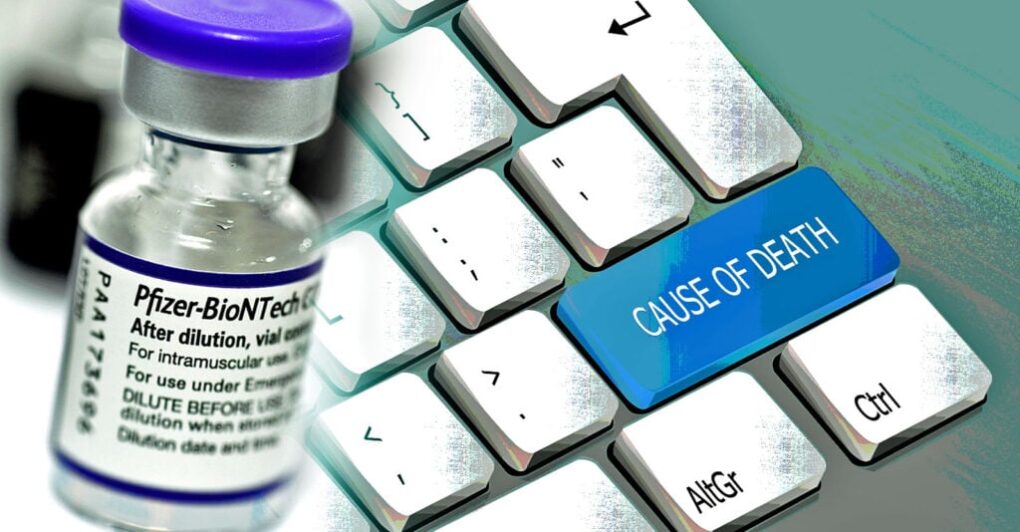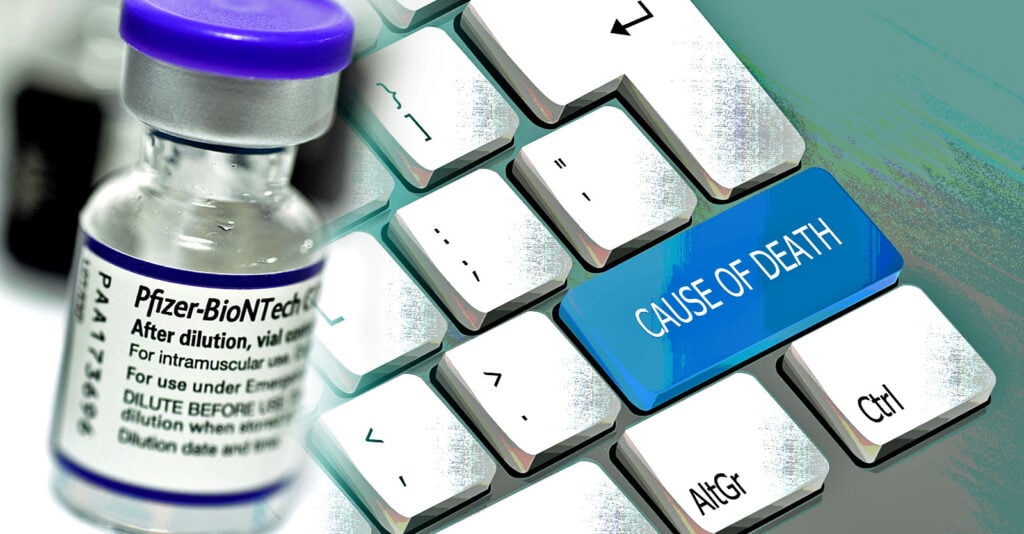Pfizer Vaccine From ‘Highly Lethal Batch’ Likely Caused Man’s Death 555 Days Later
The 47-year-old had a good medical history and was not taking medication, according to a peer-reviewed study published Feb. 8 in the International Journal of Innovative Research in Medical Science. The authors said the finding is “significant” because it demonstrates that death can occur more than a year after the primary series of mRNA shots.
Pfizer’s COVID-19 vaccine likely caused the death of a 47-year-old man who died from a pulmonary embolism 555 days after receiving the vaccine, which came from a highly lethal batch, according to a new peer-reviewed study.
The study, Feb. 8 in the International Journal of Innovative Research in Medical Science, determined that at the time of his illness, the 47-year-old had a good medical history and was not taking medication.
The study noted that the COVID-19 shots “have been previously associated with pulmonary hemorrhage, typically observed shortly after vaccination.”
In a Substack post, epidemiologist Nicolas Hulscher, co-author of the study along with cardiologist Dr. Peter McCullough — noted that this “is the first published instance of a fatal adverse event occurring more than one year after a COVID-19 mRNA injection, highlighting the potential for serious long-term adverse effects.”
According to the study, the 47-year-old “exhibited symptoms of a mild respiratory infection” before his death. However, his health rapidly deteriorated, as he experienced severe respiratory distress and cardiac arrest “with evidence of profuse pulmonary bleeding.” His heart size remained normal.
“The evidence suggests that this man died of a cardiopulmonary arrest most likely as a result of acute pulmonary hemorrhage, with the COVID-19 vaccine potentially playing a role in the development of cardiopulmonary pathology and hemorrhage,” the study concluded.
This finding is “significant, because it demonstrates that death can occur even more than a year after the primary series of mRNA [shots],” McCullough said.
“Similar studies have found pulmonary embolism, for which, if left long enough, will cause necrosis and pulmonary hemorrhage. COVID-19 vaccines are well-known to cause blood clots and pulmonary embolism,” McCullough added.
Hulscher said:
“The biological plausibility of delayed pulmonary hemorrhage following COVID-19 mRNA vaccination is supported by documented short-term cases occurring soon after injection, regulatory concerns over prolonged genetic product effects, the persistence and pathogenicity of Spike protein, and emerging evidence of potential plasmid DNA genome integration contributing to sustained Spike protein expression.”
According to the study, the U.S. Food and Drug Administration’s Center for Biologics Evaluation and Research “regulatory window of concern” for a novel genetic product, such as the Pfizer-BioNTech mRNA COVID-19 vaccine, is 5-15 years.
The study suggested this means fatal pulmonary hemorrhage should be considered a potential “consequence of the novel product even months to years after the last injection.”
Despite the autopsy’s findings and prior research on the subject indicating a possible link between mRNA shots and pulmonary embolism, “the medical examiner determined the cause of death was attributed to atherosclerotic and hypertensive cardiovascular disease, without considering the recent pulmonary hemorrhage and unremarkable medical history.”
The study also noted that the man’s autopsy failed to investigate potential contributions from the COVID-19 vaccine, such as the presence of the spike protein, vaccine mRNA or related antibodies.
Vaccine batch connected to cardiac injuries and deaths
The victim received a vaccine that originated from a batch, EW0175, that is “associated with cardiovascular, hematological, and respiratory adverse events and exhibits a high degree of lethality compared to most batches,” the study’s authors said.
Citing data from the U.S. government-run Vaccine Adverse Event Reporting System (VAERS) and the How Bad is My Batch? database, the authors found that batch EW0175 is among the top 2.8% for number of reported deaths out of all Pfizer COVID-19 vaccine batches and is associated with “fatal cardiovascular adverse events including cardiac arrest.”
The data on batch EW0175 showed 29 reports of deaths as of Feb. 2, 2024, and several reports of severe adverse events, including respiratory failure, thrombosis, myocarditis, pericarditis, cardiac arrest, myocardial infarction — and four cases of pulmonary embolism.
“Hyperaggregation of mRNA in lipid nanoparticles is the most tractable hypothesis explaining the differences in lethality from vial to vial of Pfizer and Moderna products,” McCullough said. Yet, “No government agency in the world has inspected the vials for quantity or dose of mRNA.”
Hulscher said on Substack the study’s results underscore “the importance of conducting COVID-19 ‘vaccine’ batch analyses when evaluating potential links between adverse events and the injection.”
Spike proteins likely connected to onset of pulmonary embolisms
The study also emphasized the likely connection of the spike protein in mRNA shots with adverse outcomes such as pulmonary embolisms.
According to the study, “The Spike protein produced from COVID-19 vaccine mRNA is known to cause bleeding, thrombosis and specific hemorrhagic-thrombotic syndromes including vaccine-induced thrombotic thrombocytopenia (VITT) which has been reported after the Pfizer vaccine.”
The study further noted that the discovery of residual plasmid DNA, including spike-coding sequences and the SV40 promoter/enhancer, in Pfizer vaccine lots “highlights a potential mechanism for genome integration, potentially enabling prolonged spike protein production in transfected cells.”
McCullough said, “mRNA COVID-19 vaccines produce an unlimited quantity of Spike protein which can cause clotting and bleeding at the same time.” In the case of the 47-year-old man, “the patient may have gotten to a critical level of pulmonary Spike protein” which “triggered the diffuse pulmonary hemorrhage.”
Paper targeted for censorship ‘due to severe biases’
Hulscher said the paper was the target of attempted “immense censorship and “unjustified rejection without review” during the submission process. Delayed adverse event data is “extremely difficult to publish in peer-reviewed journals due to severe biases toward COVID-19 mRNA injections,” he said.
The paper calls for testing the affected tissues of vaccinated individuals who died unexpectedly to ascertain the presence of mRNA and spike protein and also proposed autopsy protocols for people who received at least one COVID-19 shot.
“Without proper post-mortem investigation into specific COVID-19 vaccine components residing in blood and tissues, it is difficult to confidently determine the cause of death in COVID-19 vaccinated subjects that present anomalous symptoms,” the study states.
“Ηealthcare providers are encouraged to be aware of and monitor for any long-term cardiopulmonary complications that may arise after COVID-19 ‘vaccination,’” Hulscher wrote on Substack.
McCullough also called on the Centers for Disease Control and Prevention to “merge the vaccine administration data with the national death index” and “release the vaccine administration data for linkage to cancer registries and statewide death registries.”
This would allow scientists to “evaluate the distribution and determinants of death after COVID-19 vaccination,” McCullough said.



